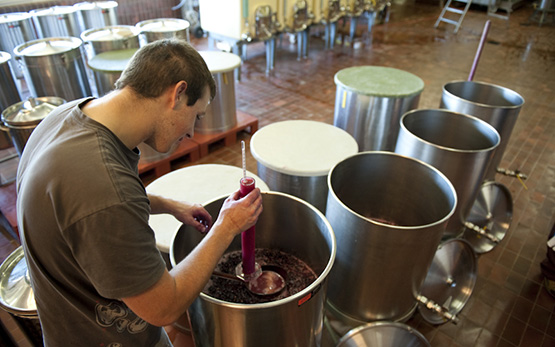In order to justify its price tag, Swiss wine must stand out for its excellent gustative quality. Such quality can be counted on if all stages of production from vine to bottle are optimally carried out. However, there might be technical problems or lack of basic knowledge in certain stages of the production chain.
Suitability for winemaking of the new grape varieties
The varieties that are resistant to fungal diseases produce grapes of good quality, but their processing into wine must be characterised both on the technical (i.e. maceration, etc.) and creative level (i.e. wine styles) in order to allow the production of unique wines that live up to international standards.
Extraction of polyphenols during maceration
Tannin quality and colour properties are key parameters for the quality of red wines. These two parameters are chiefly influenced by the dynamics of polyphenol extraction during maceration and the ensuing chemical reactions. Whereas the general concepts of these processes are known, their validity in specific instances (new grape varieties, heating of the grape harvest) still requires confirmation.
Correcting stress-induced off-flavours
The nitrogen-compound profile and lack of flavour precursors in the must are a sign of stress-induced off-flavours. Despite this, the minimum thresholds for nitrogen in musts for the different grape varieties do not appear to be homogeneous, and will need to be determined. Moreover, the transformation of the precursors into aromatic compounds could be favoured by yeast metabolism and protection from oxidation. An oenological practice allowing these off-flavours to be corrected has thus yet to be found. Finally, a chemical marker in wines that correlates with the stress-induced off-flavour indicating poor nitrogen nutrition of the vine would be useful for supporting wine advice and research.
Partial raisining
Partial raisining clearly improves wine quality, but the practical application of this process is still empirical. A more in-depth knowledge of the physical and biochemical mechanisms that operate during the raisining process will allow us to develop decision-making tools for mastering this technique.
Winemaking with high pH levels
One of the effects of global warming on wine production is the increased pH in musts and wines. Although this phenomenon may be attractive from an organoleptic perspective, it also has a sizeable impact on the microbial dynamics of winemaking. Crop-management sequences preventing the development of undesirable microorganisms and allowing control of the proper progress of malolactic fermentation are to be tested.






